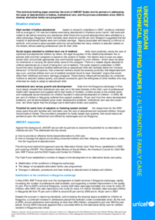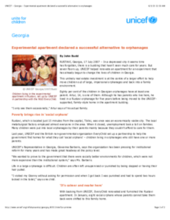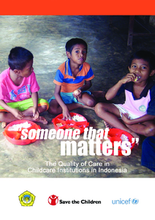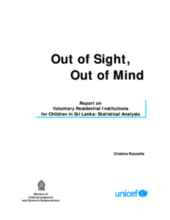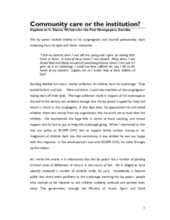Displaying 1341 - 1350 of 1465
Decision No. 1361 on the approval of the Framework Regulations on the Foster Care Service was enacted by the Government of the Republic of Moldova on December 21, 2007 in order to implement the Law on social assistance (No 547-XV as of December 25, 2003) as well as to achieve the National Strategy and Action Plan on the Reform of the Residential Childcare System for 2007-2012, approved by Government Decision No 784, as of July 9, 2007.
Project Evaluation Report for UNICEF Moldova
On 31 October 2007, the Government of the Republic of Moldova issued Decision No. 1177 on the setting up of the Commission for the Protection of the Child in Difficulty and Approval of the Framework Regulations on the activity of the Commission.
Examines the work of UNICEF Sudan and its partners in addressing the issue of abandonment of babies, institutional care, and the process undertaken since 2003 to develop alternative family care programmes.
A report on residential care in South Africa in the context of AIDS and an under-resourced social welfare sector.
In Georgia, UNICEF and EveryChild have teamed up to place children in need of alternative care in small, supervised apartments as an alternative to orphanages.
The aim of this report is to review international human rights norms as well as Liberian legislation, and to assess the compliance of orphanages with those standards.
Comprehensive evaluation of national responses and level of care standards for children without parental care in Indonesia.
This report provides a general overview of the situation of voluntary residential care institutions in Sri Lanka through the results of a national assessment campaign conducted in all districts by Probation Officers and Child Rights Promotion Officers.
Brief article observing the proliferation of orphanages in Zambia. Points to several models of community-based care as alternatives better able to address the rights and needs of children.




